Erstellt am: 5. 6. 2016 - 14:35 Uhr
Making Tea More Fair
As you pass on the roads that wind through central Sri Lanka, you’ll see the hills are cloaked in a uniform lush green. These are tea bushes and they have brought a lot of wealth to the country, from the colonial period to now. The world famous ‘Ceylon Tea’ accounts for a third of the tea that is produced globally.
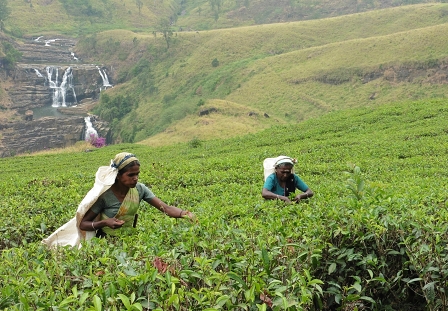
Chris Cummins
The first to benefit from tea trade were the British colonialists, who introduced the cash-crop to the moist hills in the mid-19th century. After independence, with a global thirst for tea that seems never able to be quenched, the industry was a motor for rising confidence.
But the spoils haven’t been properly shared by those who pluck the tea.
Dieses Element ist nicht mehr verfügbar
The industry employs 10 percent of the country’s labour force who still pick the bushes by hand in their brightly coloured saris. From a distance, it looks as if Technicolor moths have descended on the tea plantations. It’s a romantic image for the tourists, but the reality of the tea pluckers’ lives is anything but romantic.
Dignity is Paramount
Ashika Gunasena, the assistant country Director at CARE Sri Lanka says, the tea pluckers are "some of the poorest and most marginalized people in the country." She says, that for the workers of the estate "the issue of dignity is paramount."
They want better wages of course, but they want their voices to be heard and they want to be respected.
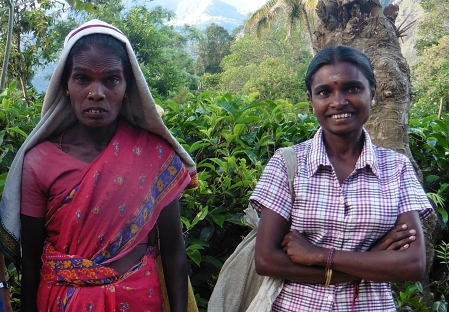
Chris Cummins
Carrying on a century long tradition, nearly 95 percent of the tea pluckers are women and they are among the lowest paid workers in Sri Lanka. They suffer from a very low social status. This is what CARE is battling to change - by working together with the government, tea companies, the trade unions and the workers themselves.
"A lot of the work that we do in Sri Lanka is about understanding how the tea industry as a whole must begin to look at the workers from the point of not being a liability but as an asset, part of the production process and as such to be treated as assets."
A Difficult Social History
That might seem natural - they would be no tea to drink if it wasn't for the hard-working women who pluck the leaves and prune the bushes. For a tea addict like me, they are heroines! But to understand the difficult social position of the tea pluckers in Sri Lanka, you have to understand their history. It’s a story marred by colonial era snobbery, questions of ethnicity and caste and the taint of being seen as 'labourers' and 'outsiders'.
The British shipped a whole new community to these hills, with a different language, Tamil, and religion, Hinduism, into an area that was predominately Singhalese and Buddhist. "These are people who were brought in by the British to work on the tea estates of Sri Lanka because the local Sri Lankans refused to work on the estates", explains Gunasena. "The result was, that the British brought in people from Southern India work on the tea plantations. They were brought in basically as labour and they were pretty much confined to the tea estates."
As writer John Gimlette, author of the travel memoir Elephant Complex, found out, many of them they were shipped to the north and then made to walk for days to the mountains.
A million "Tea Tamils" still work on the plantations and many still live in the basic cramped barrack like houses built for them by the disdainful British in the late 19th century; settlements which are still today known by the colonial term "the lines".
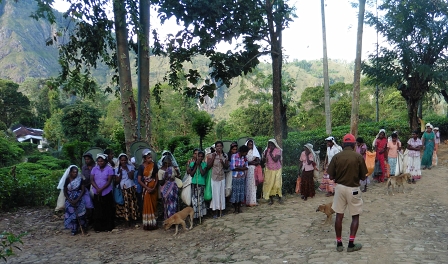
Chris Cummins
These are usually found a long way down dirt tracks - far from the eyes of most tourists enjoying the luxurious romance of the tea-estates: The houses are often dark and cramped, several generations can share one sleeping room, and food is cooked in open fires in ill-ventilated rooms. Respiratory diseases are common. Everyone seems to have a cough.
John Gimlette likens the conditions to those of a "Victorian slum". It can seem as though time and development stood still after the accommodation was built in the late 19th century.
Stripped of Voting Rights
None of this has helped the tea pluckers enjoy much status. Having lived in such segregated communities, the so called "Tea Tamils" were viewed as foreign and separate when independence was won in 1948. They were immediately stripped of their voting rights and consequently citizenship - an injustice that was only completely rectified in 2003.
"There was a lot of activism from the outside of the estates as well to say these people are also citizens", explains Ashika Gunasena. And at one time they were given the choice either to go back to India or to stay in Sri Lanka. And some of them left and went back but many decided to stay because generation after generation has lived in these estates.
Left On Their Own
And as travel writer John Gimlette explains, even their ethnic cousins, the Tamils of north-eastern Sri Lanka, have showed very little interest in the tea plucking communities. Even though, after independence, the northern Tamils were beginning their own struggle for minority rights in a Sinhalese-dominated country they have found little kinship with the ‘Tea Tamils’:
"The two groups don’t necessarily communicate with one another, they speak a different dialect and they are from a different caste. So they don’t really relate at all."
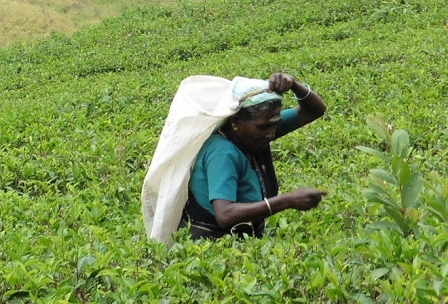
Chris Cummins
This sense of alienation is important. According to CARE the view of them being 'outsiders' has obstructed their access to services, development or economic opportunities available to other Sri Lankans.
Dieses Element ist nicht mehr verfügbar
Harsh Working Conditions
Care’s Ashika Gunasena points out that. Despite the low wages, the pluckers have to endure very arduous conditions - long hours spent under a harsh tropical sun, the power of its rays magnified by the altitude.
"They are working from around 8.30 in the morning until 4 in the afternoon. They have to pluck around 15kg of tea in order to get paid a certain amount of money."
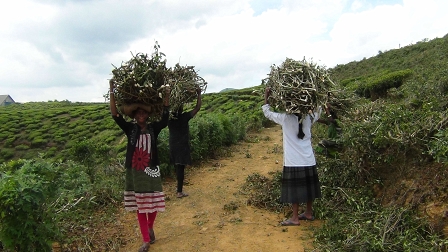
Chris Cummins
At the moment this hard graft they are paid around 700 rupees which is about 4.2 euros. To put that in perspective - that's about the price a tourist would pay for a couple of mango lassis, or, in fact, a couple of pots of tea.
"That price is to do what the companies have negotiated with the trade unions," explains Gunasena, "Every two years or so there is what is called a 'collective agreement'. The unions negotiate for a price hike with the tea companies. But there is a lot of discussion in Sri Lanka about making this a 'living wage'."
What's A Living Wage in Sri Lanka?
"The companies argue that alongside the daily wage the workers are provided with housing, electricity and a subsidy for food. So when they calculate the whole package, the companies consider that a living wage because the workers are getting all these other facilities."
But a visit to 'the lines' shows the money isn’t allowing a particularly dignified life. Gunasena says the money is often not enough to make ends meet on a daily basis. Negotiations have dragged on for years while workers find themselves in ever more desperate conditions and are often caught up in a cycle of debt.
"We need to produce tea more ethically"
But perhaps times are beginning to change. "You have a lot of progressive companies who have invested in the housing and who have invested in the welfare of the workers so much more than the others. They understand that the industry itself is transforming. We are losing the traditional tea market that we had in the past. And the companies know that if they are going to encourage more tea drinkers in Europe and the USA we need to produce the tea much more ethically."
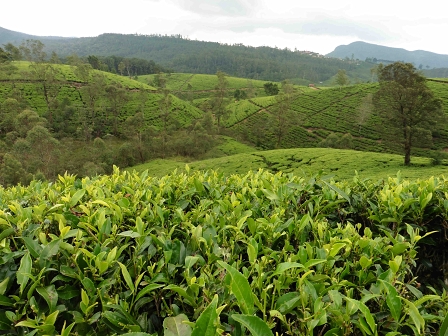
Chris Cummins
In other words the voice of a more conscious market is helping push for positive change, but sadly that voice remains relatively week. Gunasena says the ethical market is a "niche market". Too many of us don't give a thought to how our tea is picked.
Ethical Tea
In order to encourage this trend, Gunasena urges consumers in Europe to look for Ethical Tea Partnership label on the packages of tea available in tea shops and supermarkets.
"If you look at the tea buyers right now who are sourcing from Sri Lanka there are many that are saying that they want producers to uphold ethical standards in exchange for a certification."
Companies, eager for that ethical label, are changíng their philosophy.
"Some companies are very interested in changing the worker management relationship and they taking proactive action to change the way workers are treated. And as such ethical tea is gaining some ground but I wouldn’t say it is significant yet."


